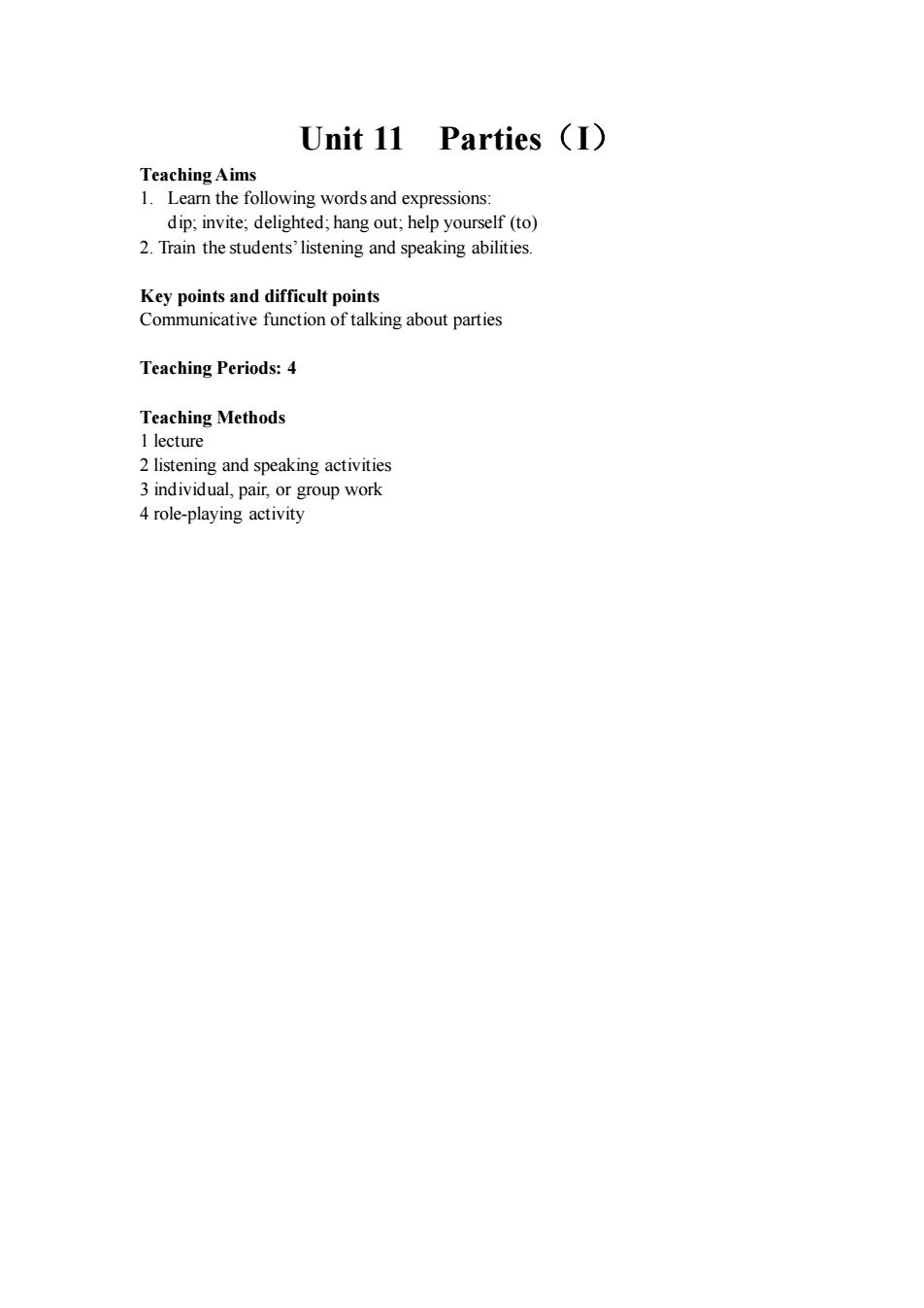
Unit 11 Parties (I) Teaching Aims 1.Leamn the following words and expressions: dip;invite;delighted;hang out;help yourself(to) 2.Train the students'listening and speaking abilities. Key points and difficult poin Communicative function of talking about parties Teaching Periods:4 Teaching Methods lecture 2 listening and speaking activities 3 individual,pair,or group work 4 role-playing activity
Unit 11 Parties(I) Teaching Aims 1. Learn the following words and expressions: dip; invite; delighted; hang out; help yourself (to) 2. Train the students’ listening and speaking abilities. Key points and difficult points Communicative function of talking about parties Teaching Periods: 4 Teaching Methods 1 lecture 2 listening and speaking activities 3 individual, pair, or group work 4 role-playing activity
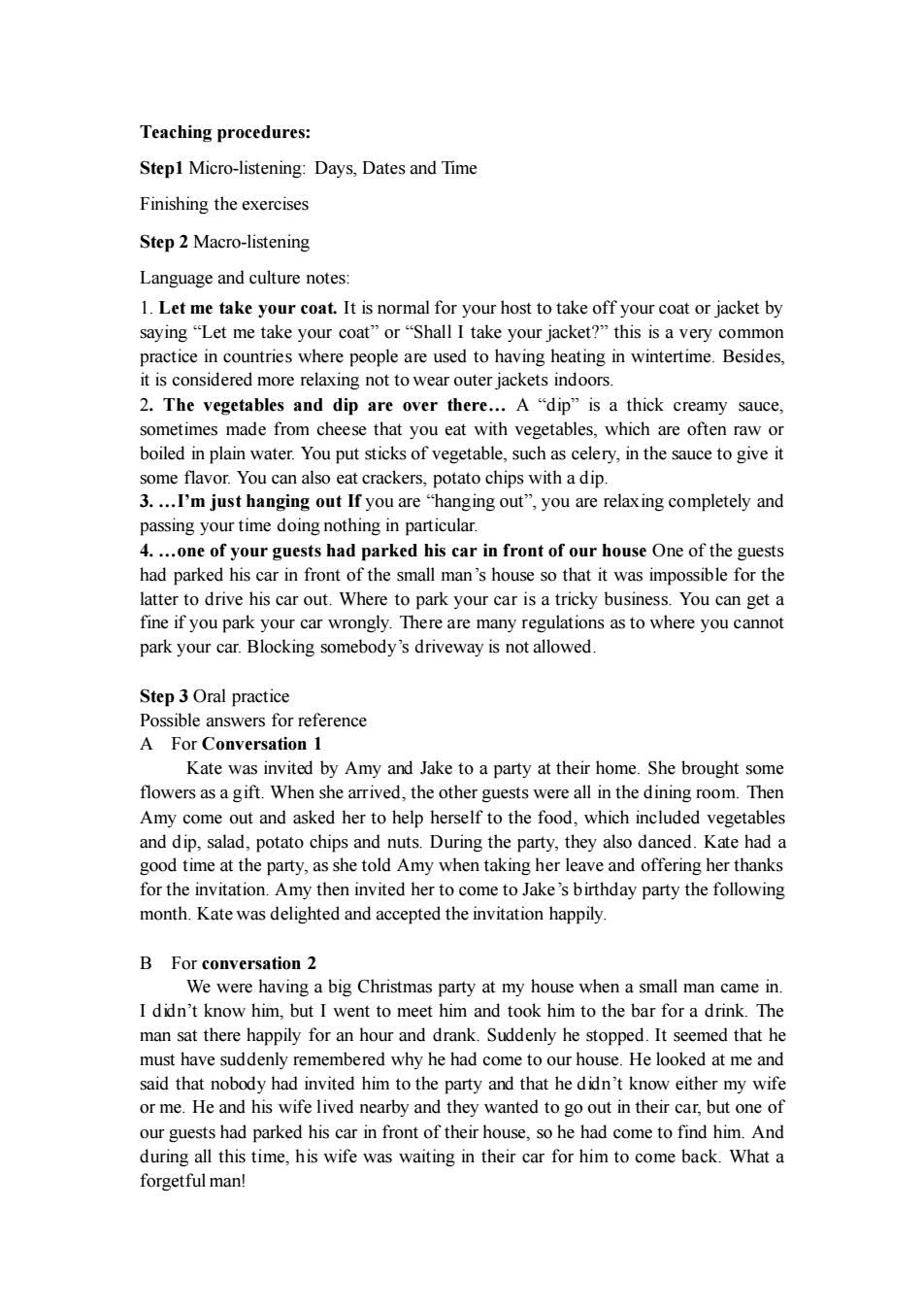
Teaching procedures: Stepl Micro-listening:Days,Dates and Time Finishing the exercises Step 2 Macro-listening Language and culture notes: 1.Let me take your coat.It is normal for your host to take off your coat or jacket by saying"Let me take your coat"or"Shall I take your jacket?"this is a very common practice in countries where people are used to having heating in wintertime.Besides, it is considered more relaxing not to wear outer jackets indoors. 2.The vegetables and dip are over there...A"dip "is a thick creamy sauce sometimes made from cheese that you eat with vegetables,which are often raw or boiled in plain water.You put sticks of vegetable,such as celery,in the sauce to give it some flavor.You can also eat crackers,potato chips with a dip. 3....I'm just hanging out If you are"hanging out",you are relaxing completely and had parked his car in front of the small man's house so that it was impossible for the latter to drive his car out.Where to park your car is a tricky business.You can get a fine if you park your car wrongly.There are many regulations as to where you cannot park your car.Blocking somebody's driveway is not allowed. Step 3 Oral practice Possible answers for reference A For Conversation 1 Kate was invited by Amy and Jake to a party at their home.She brought some flowers as a gift.When she arrived.the othe guests ere all in the dinin room.Then Amy come out and asked her to help herself to the food,which included vegetables and dip,salad,potato chips and nuts.During the party,they also danced.Kate had a good time at the party,as she told Amy when taking her leave and offering her thanks for the invitation.Amy then invited her to come to Jake's birthday party the following month.Kate was delighted and accepted the invitation happily. B For conversation 2 We were having a big Christmas party at my house when a small man came in. I didn't know him,but I went to meet him and took him to the bar for a drink.The man sat there happily for an hour and drank.Suddenly he stopped.It seemed that he must have sudd reme ered why he had come t He looked at me ar said that nobody had invited him to the party and that he didn't know either my wif or me.He and his wife lived nearby and they wanted to go out in their car,but one of our guests had parked his car in front of their house,so he had come to find him.And during all this time,his wife was waiting in their car for him to come back.What a forgetful man!
Teaching procedures: Step1 Micro-listening: Days, Dates and Time Finishing the exercises Step 2 Macro-listening Language and culture notes: 1. Let me take your coat. It is normal for your host to take off your coat or jacket by saying “Let me take your coat” or “Shall I take your jacket?” this is a very common practice in countries where people are used to having heating in wintertime. Besides, it is considered more relaxing not to wear outer jackets indoors. 2. The vegetables and dip are over there… A “dip” is a thick creamy sauce, sometimes made from cheese that you eat with vegetables, which are often raw or boiled in plain water. You put sticks of vegetable, such as celery, in the sauce to give it some flavor. You can also eat crackers, potato chips with a dip. 3. …I’m just hanging out If you are “hanging out”, you are relaxing completely and passing your time doing nothing in particular. 4. …one of your guests had parked his car in front of our house One of the guests had parked his car in front of the small man’s house so that it was impossible for the latter to drive his car out. Where to park your car is a tricky business. You can get a fine if you park your car wrongly. There are many regulations as to where you cannot park your car. Blocking somebody’s driveway is not allowed. Step 3 Oral practice Possible answers for reference A For Conversation 1 Kate was invited by Amy and Jake to a party at their home. She brought some flowers as a gift. When she arrived, the other guests were all in the dining room. Then Amy come out and asked her to help herself to the food, which included vegetables and dip, salad, potato chips and nuts. During the party, they also danced. Kate had a good time at the party, as she told Amy when taking her leave and offering her thanks for the invitation. Amy then invited her to come to Jake’s birthday party the following month. Kate was delighted and accepted the invitation happily. B For conversation 2 We were having a big Christmas party at my house when a small man came in. I didn’t know him, but I went to meet him and took him to the bar for a drink. The man sat there happily for an hour and drank. Suddenly he stopped. It seemed that he must have suddenly remembered why he had come to our house. He looked at me and said that nobody had invited him to the party and that he didn’t know either my wife or me. He and his wife lived nearby and they wanted to go out in their car, but one of our guests had parked his car in front of their house, so he had come to find him. And during all this time, his wife was waiting in their car for him to come back. What a forgetful man!
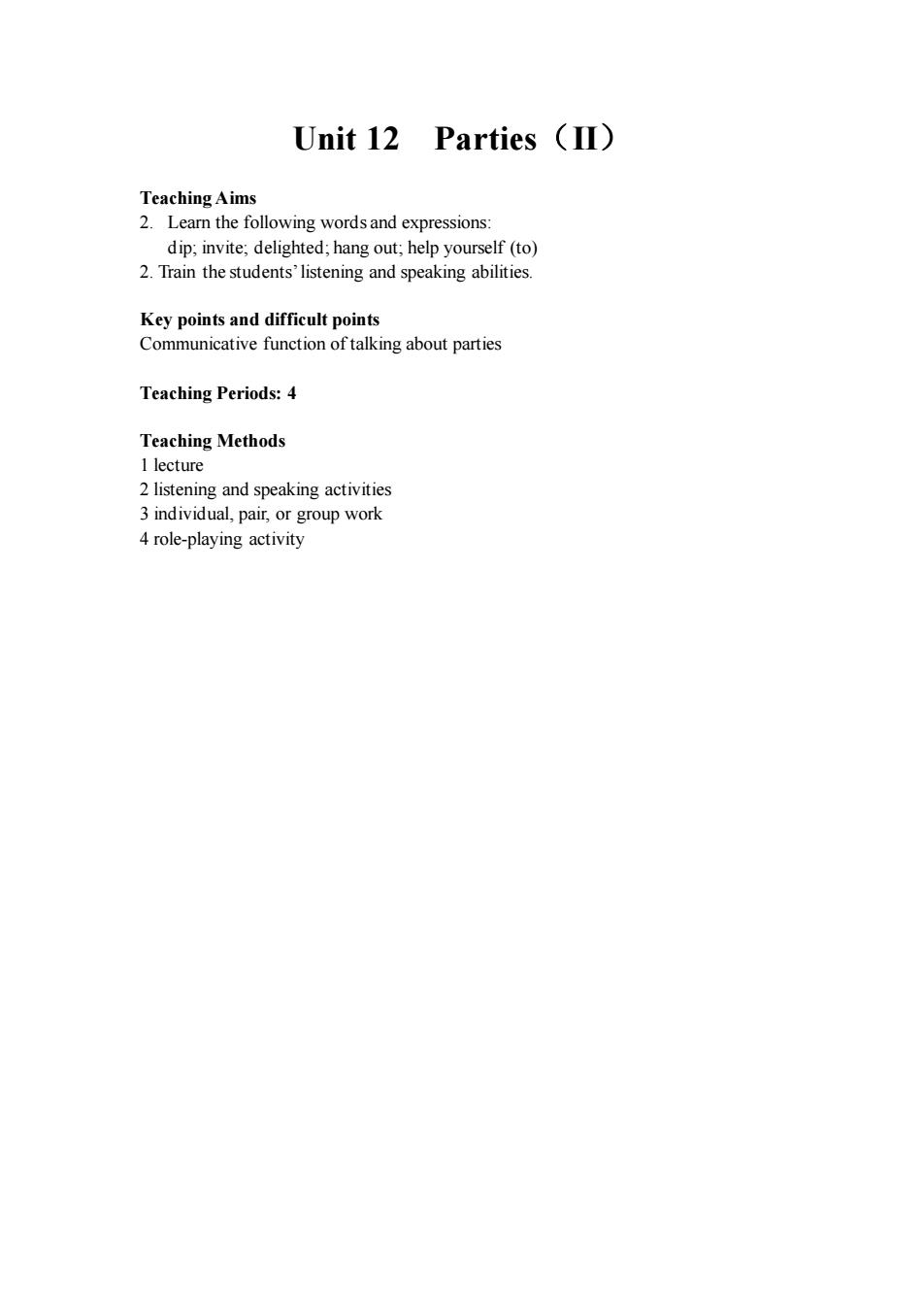
Unit 12 Parties (II) Teaching Aims 2.Learn the following words and expressions: dip;invite:delighted;hang out;help yourself(to) 2.Train the students'listening and speaking abilitie Key points and difficult points Communicative function of talking about parties Teaching Periods:4 Teaching Methods 1 lecture 2 listening and speaking activities 3 individual,pair,or group work 4 role-playing activity
Unit 12 Parties(II) Teaching Aims 2. Learn the following words and expressions: dip; invite; delighted; hang out; help yourself (to) 2. Train the students’ listening and speaking abilities. Key points and difficult points Communicative function of talking about parties Teaching Periods: 4 Teaching Methods 1 lecture 2 listening and speaking activities 3 individual, pair, or group work 4 role-playing activity
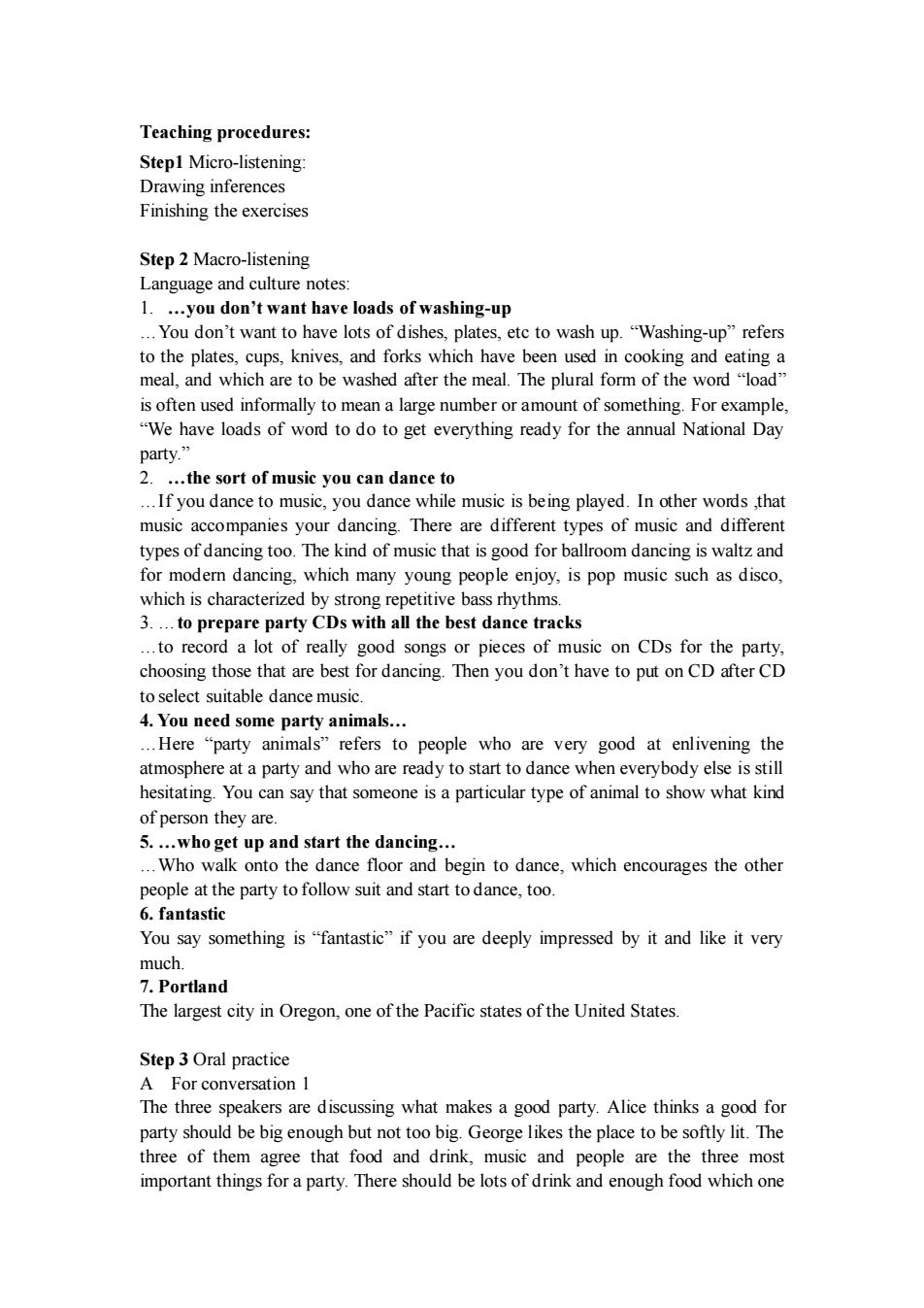
Teaching procedures: Step1 Micro-listening Drawing inferences Finishing the exercises Step2 Macro-listening Language and culture notes 1....you don't want have loads of washing-up ...You don't want to have lots of dishes,plates,etc to wash up."Washing-up"refers to the plates,cups,knives,and forks which have been used in cooking and eating a meal,and which are to be washed after the meal.The plural form of the word"load" often used informally to mean a large number or amount of something.For exan "We have loads of word to do to get everything ready for the annual National Day party. 2....the sort of music you can dance to ...If you dance to music,you dance while music is being played.In other words that music accompanies your dancing.There are different ty for modern dancing.which many young people enjoy,is pop music such as disco. which is characterized by strong repetitive bass rhythms. 3....to prepare party CDs with all the best dance tracks good songs or pieces ofmusi CDs for the party. that are best for dancing.Then you don't have to put on CD after CD to select suitable dance music. 4.You need some party animals... ..Here "party animals"refers to people who are very good at enlivening the atmosphere at a party and who are ready to start to dance when everybody else is still hesitating.You can say that som is a particular type of animal to show what kind of person they are. 5....who get up and start the dancing... ..Who walk onto the dance floor and begin to dance,which encourages the other people at the party to follow suit and start to dance,too. 6.fantastic You say something is"fantastic"if you are deeply impressed by it and like it very much. 7.Portland The largest city in Oregon,one of the Pacific states of the United States. Step3 Oral practice For conversation I The three speakers are discussing what makes a good party.Alice thinks a good for party should be big enough but not too big.George likes the place to be softly lit.The thee of them agre that food and rink.music and most important things for a party.There should be lots of drink and enough food which one
Teaching procedures: Step1 Micro-listening: Drawing inferences Finishing the exercises Step 2 Macro-listening Language and culture notes: 1. …you don’t want have loads of washing-up …You don’t want to have lots of dishes, plates, etc to wash up. “Washing-up” refers to the plates, cups, knives, and forks which have been used in cooking and eating a meal, and which are to be washed after the meal. The plural form of the word “load” is often used informally to mean a large number or amount of something. For example, “We have loads of word to do to get everything ready for the annual National Day party.” 2. …the sort of music you can dance to …If you dance to music, you dance while music is being played. In other words ,that music accompanies your dancing. There are different types of music and different types of dancing too. The kind of music that is good for ballroom dancing is waltz and for modern dancing, which many young people enjoy, is pop music such as disco, which is characterized by strong repetitive bass rhythms. 3. …to prepare party CDs with all the best dance tracks …to record a lot of really good songs or pieces of music on CDs for the party, choosing those that are best for dancing. Then you don’t have to put on CD after CD to select suitable dance music. 4. You need some party animals… …Here “party animals” refers to people who are very good at enlivening the atmosphere at a party and who are ready to start to dance when everybody else is still hesitating. You can say that someone is a particular type of animal to show what kind of person they are. 5. …who get up and start the dancing… …Who walk onto the dance floor and begin to dance, which encourages the other people at the party to follow suit and start to dance, too. 6. fantastic You say something is “fantastic” if you are deeply impressed by it and like it very much. 7. Portland The largest city in Oregon, one of the Pacific states of the United States. Step 3 Oral practice A For conversation 1 The three speakers are discussing what makes a good party. Alice thinks a good for party should be big enough but not too big. George likes the place to be softly lit. The three of them agree that food and drink, music and people are the three most important things for a party. There should be lots of drink and enough food which one
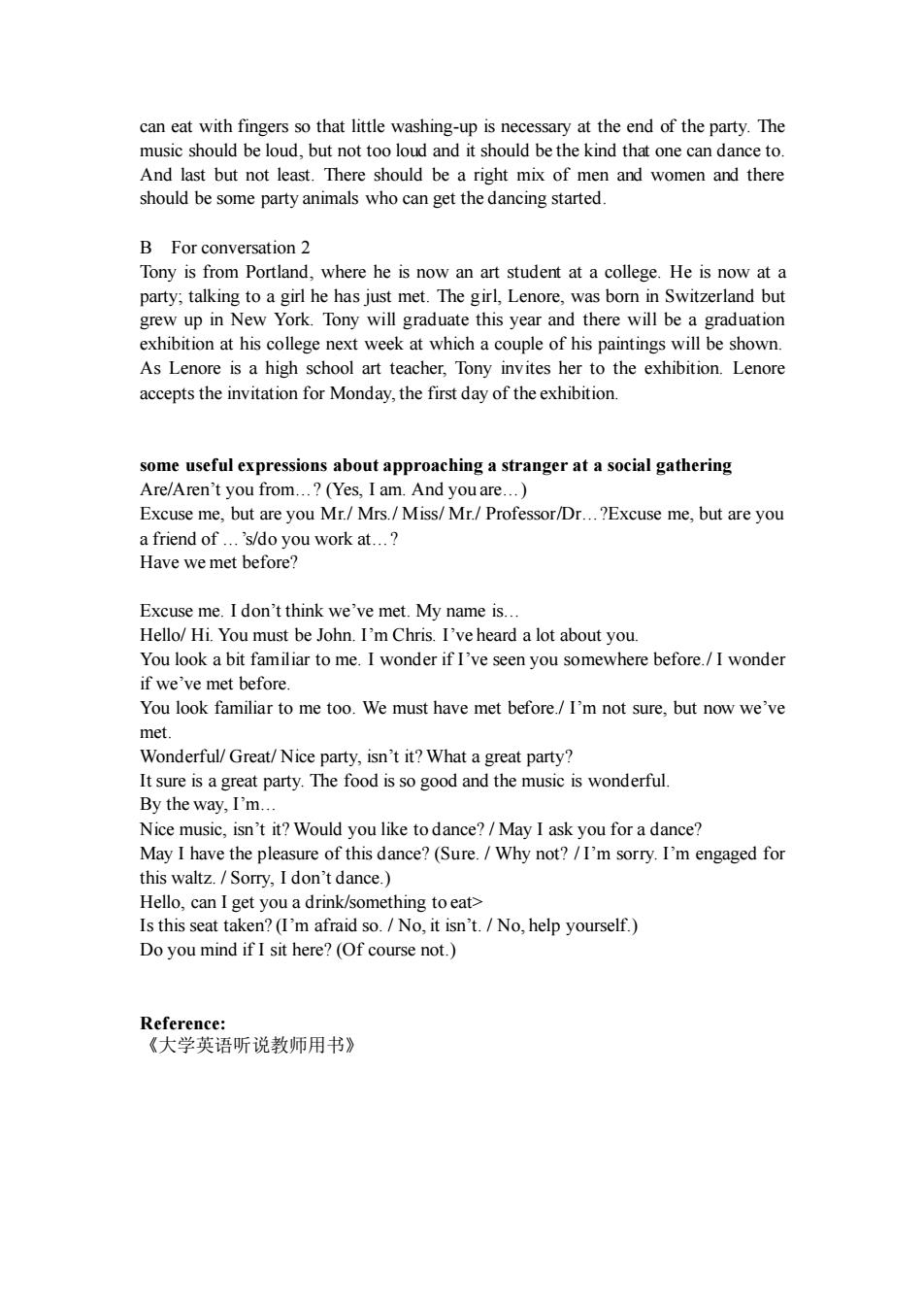
can eat with fingers so that little washing-up is necessary at the end of the party.The music should be loud,but not too loud and it should be the kind that one can dance to. And last but not least.There should be a right mix of men and women and there should be some party animals who can get the dancing started. B For conversation 2 Tony is from Portland,where he is now an art student at a college.He is now at a party;talking to a girl he has just met.The girl,Lenore,was born in Switzerland but grew up in New York.Tony will graduate this year and there will be a graduation exhibition at his college next week at which a couple of his paintings will be shown. As Lenore is a high school art teacher,Tony invites her to the exhibition.Lenore accepts the invitation for Monday,the first day of the exhibition. some useful expressions about approaching a stranger at a social gathering Are/Aren't you from...?(Yes,I am.And you are...) Excuse me,but are you Mr./Mrs./Miss/Mr./Professor/Dr...?Excuse me,but are you a friend of...'s/do you work at...? Have we met before? Excuse me.I don't think we've met.My name is... Hello/Hi.You must be John.I'm Chris.I've heard a lot about you. You look a bit familiar to me.I wonder if I've seen you somewhere before./I wonder if we've met before. You look familiar to me too.We must have met before./I'm not sure,but now we've met. Wonderful/Great/Nice party,isn't it?What a great party? It sure is a great party.The food is so good and the music is wonderful. By the way,I'm... Nice music,isn't it?Would you like to dance?/May I ask you for a dance? May I have the pleasure of this dance?(Sure./Why not?/I'm sorry.I'm engaged for this waltz./Sorry,I don't dance.) Hello,can I get you a drink/something to eat> Is this seat taken?(I'm afraid so.No,it isn't./No,help yourself.) Do you mind if I sit here?(Of course not.) Reference: 《大学英语听说教师用书》
can eat with fingers so that little washing-up is necessary at the end of the party. The music should be loud, but not too loud and it should be the kind that one can dance to. And last but not least. There should be a right mix of men and women and there should be some party animals who can get the dancing started. B For conversation 2 Tony is from Portland, where he is now an art student at a college. He is now at a party; talking to a girl he has just met. The girl, Lenore, was born in Switzerland but grew up in New York. Tony will graduate this year and there will be a graduation exhibition at his college next week at which a couple of his paintings will be shown. As Lenore is a high school art teacher, Tony invites her to the exhibition. Lenore accepts the invitation for Monday, the first day of the exhibition. some useful expressions about approaching a stranger at a social gathering Are/Aren’t you from…? (Yes, I am. And you are…) Excuse me, but are you Mr./ Mrs./ Miss/ Mr./ Professor/Dr…?Excuse me, but are you a friend of …’s/do you work at…? Have we met before? Excuse me. I don’t think we’ve met. My name is… Hello/ Hi. You must be John. I’m Chris. I’ve heard a lot about you. You look a bit familiar to me. I wonder if I’ve seen you somewhere before./ I wonder if we’ve met before. You look familiar to me too. We must have met before./ I’m not sure, but now we’ve met. Wonderful/ Great/ Nice party, isn’t it? What a great party? It sure is a great party. The food is so good and the music is wonderful. By the way, I’m… Nice music, isn’t it? Would you like to dance? / May I ask you for a dance? May I have the pleasure of this dance? (Sure. / Why not? / I’m sorry. I’m engaged for this waltz. / Sorry, I don’t dance.) Hello, can I get you a drink/something to eat> Is this seat taken? (I’m afraid so. / No, it isn’t. / No, help yourself.) Do you mind if I sit here? (Of course not.) Reference: 《大学英语听说教师用书》